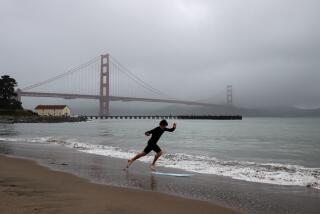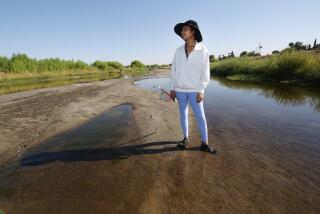U.S. Opposes Suit to Channel Water to Salmon
The Bush administration moved vigorously Monday to block a court bid by fishermen and environmentalists to protect young coho salmon, contending that increased flows in the Klamath River would come at the expense of upstream farmers and wildlife.
Justice department lawyers argue in papers filed in U.S. District Court in Oakland that there is insufficient proof that the coho would benefit if more water is sent down the river during April and May to California’s North Coast.
“If the flows plaintiffs demand were to be implemented now, the consequences would be severe to upstream resources,” the papers state.
The government is responding to a lawsuit filed last week by the Pacific Coast Federation of Fishermen’s Assns. and six environmental groups. The suit seeks to provide more water to the young salmon during the spring, when tiny “fry” seek refuge along riverbanks and year-old coho salmon move downstream to the sea.
It also takes the unusual step of asking a judge to move immediately to increase flows to the fish, even if that means cutting water deliveries to farmers.
The environmentalists’ request for a court order has heightened year-old tensions over who deserves water in the Klamath River Basin, an issue that last summer sparked a virulent water war in the West.
This summer promised to be more peaceful, with the basin receiving substantially more water from rain and snowfall than it did during last year’s drought.
But the area remains one of the nation’s key battlegrounds in a fight over the Endangered Species Act, with many farmers lambasting the law for putting the welfare of fish before that of people.
An expert in environmental law said Monday that the type of order requested by fishermen and environmentalists is typically hard to obtain.
“Plaintiffs have a heavy burden of proof,” said Michael Bean, an attorney specializing in endangered species issues at the nonprofit Environmental Defense.
The Bush administration’s stand on how to divide water between farmers and fish rests largely on an interim report from a panel of the National Academy of Sciences. This winter, the group found fault with some of the methodology used by federal wildlife regulators to justify protecting salmon and other rare fish.
But another environmental law expert, Dan Tarlock, of Chicago-Kent College of Law, questioned whether the scientific panel’s findings will carry sufficient weight in court. The group has no formal jurisdiction under the Endangered Species Act and it focused more on upriver issues, rather than those downstream where the salmon live.
“There are vulnerabilities there,” Tarlock said.
Supporting the government’s action Monday were lawyers for the region’s farmers, who recalled the devastation to their crops when water was withdrawn last year.
“The survivors of 2001 have returned to their lives. Crops are in the ground, being watered, and there is hope,” wrote attorneys for the Klamath Water Users Assn. “Dissatisfied, plaintiffs seek to put a stop to a community’s recovery.”
In their original lawsuit, commercial fishermen and environmentalists represented by Earthjustice Legal Defense Fund cited the coho’s protected status under the Endangered Species Act. The designation requires federal agencies to take special steps to keep the species from extinction.
That led federal officials last year to virtually cut off water to 1,200 farmers served by the U.S. Bureau of Reclamation’s Klamath irrigation project. In the midst of a record drought, many farmers joined in anti-government protests while others were forced to file for bankruptcy.
This year, farmers hoped that the water would continue to flow after the National Academy panel criticized regulators.
More to Read
Sign up for Essential California
The most important California stories and recommendations in your inbox every morning.
You may occasionally receive promotional content from the Los Angeles Times.










